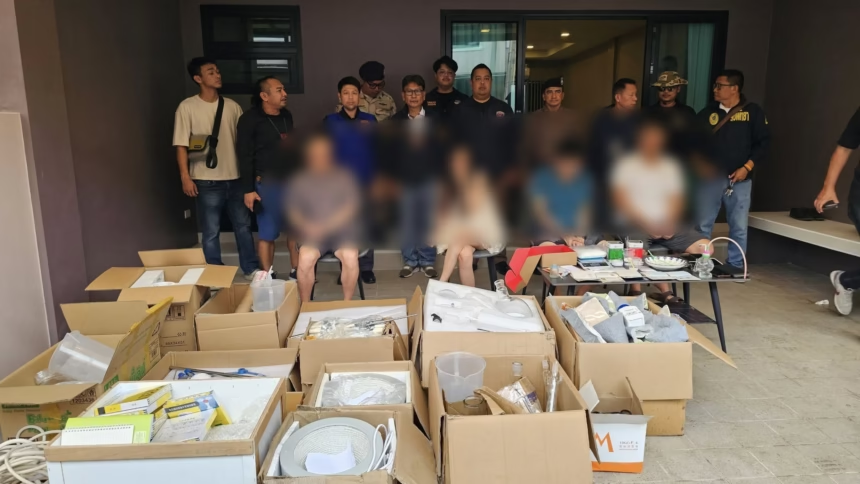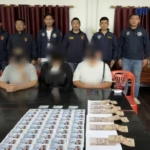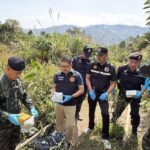PATTAYA — Police and local agencies raided two townhomes off Huay Yai Road and found large quantities of ketamine and crystal meth, along with gear believed to be used for producing the drug. One man tried to destroy evidence by pouring chemicals into a toilet.
The operation began at 1:30 p.m. on October 31, 2025, with more than 40 officers from Pattaya City Police Station, Nong Prue Police Station, Huay Yai Police Station, Tourist Police, Immigration Police, and Banglamung District officials. The raid followed the arrest two days earlier of several Chinese suspects accused of making ketamine-laced e-cigarettes known locally as “pot K.”
Police surrounded two adjoining two-storey townhouses in Moo 1, Huay Yai, then searched them at the same time.
In the first unit, officers found two Chinese men and a Vietnamese woman. Ketamine was scattered in rice bowls, plastic tubs, and clear bags. Drug tools lay on the living room table. Police also seized about 500 grams of high-grade crystal meth, various utensils, and two vape devices believed to contain ketamine.
The man who said the drugs were his was identified as Mr. Kai Yu Lin, 38. He told police he bought the drugs for personal use from an entertainer in Pattaya and denied selling them. The other two occupants, Mr. Chan Hsun-Shing, 40, a Chinese national, and Mrs. Nguyen Thi Truc Ly, 32, from Vietnam, said they had nothing to do with the drugs.
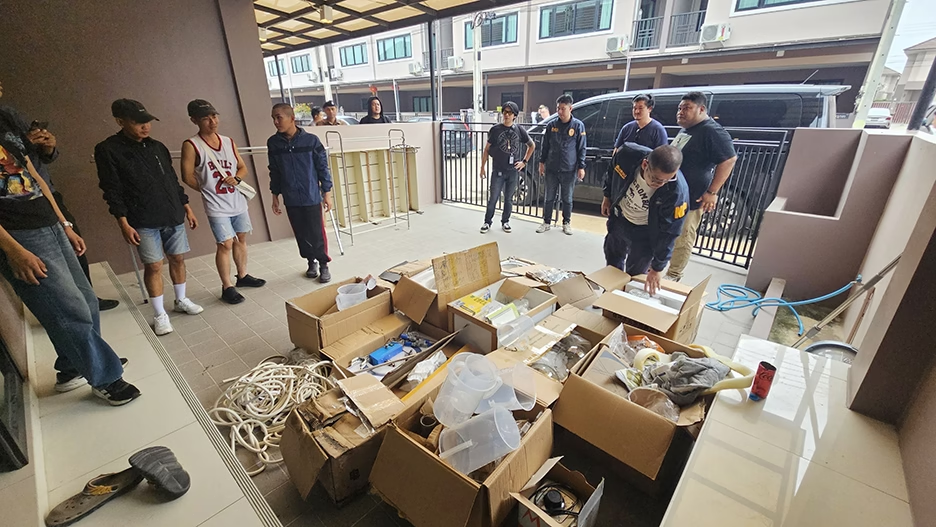
The second townhouse brought a more dramatic scene. Officers saw a Chinese man, later identified as Mr. Shuangxi Jian, 46, described as Malaysian-Chinese, run to an upstairs bathroom. He emptied two brown glass bottles into the toilet until they were drained. Officers detained him and continued the search.
Inside, police found new equipment with Chinese labels that appeared to be used for mixing chemicals to synthesize ketamine. They recovered chemicals, including sodium, methanol, and other unidentified substances, as well as a large number of clear zip-lock bags. Everything was seized.
Mr. Jian told police he had been guarding the property for about a year for a Taiwanese boss who planned to open a chemical business. He said he did not know what the chemicals were and claimed his employer told him to flush any substances if police arrived and the situation looked bad. He admitted he followed those instructions during the raid but said he did not know the purpose of the chemicals.
Chinese-Linked Crime in Thailand
The operation followed orders from Pol. Lt. Gen. Chatchai Surachetphong, Commander of Police Region 2, is to step up action against Chinese suspects involved in crime in the Banglamung area, especially drug cases. Confessions from the recently arrested “pot K” group pointed to a base within Huay Yai Police jurisdiction. Investigators believe the mastermind was preparing to leave Thailand.
Although police seized a large amount of evidence, they doubt the suspects’ claims. Investigators suspect the setup was a ketamine lab, but those in custody have given little useful detail. Work is ongoing to find and arrest those behind the network.
Since tourism rebounded in 2023, crime linked to Chinese nationals and syndicates has grown across Thailand, and the trend carried through 2024 into 2025. Thailand’s reliance on Chinese visitors, visa waivers, and easy access to Myanmar and Laos has made the country a base and transit point for cross-border crime tied to groups originating in China.
Common activities include online scams, human trafficking, drug smuggling, and money laundering, often tied to scam centres in the Golden Triangle. The problem has strained ties with Beijing, hurt tourism, and triggered joint crackdowns, but enforcement faces hurdles tied to corruption and regional politics.
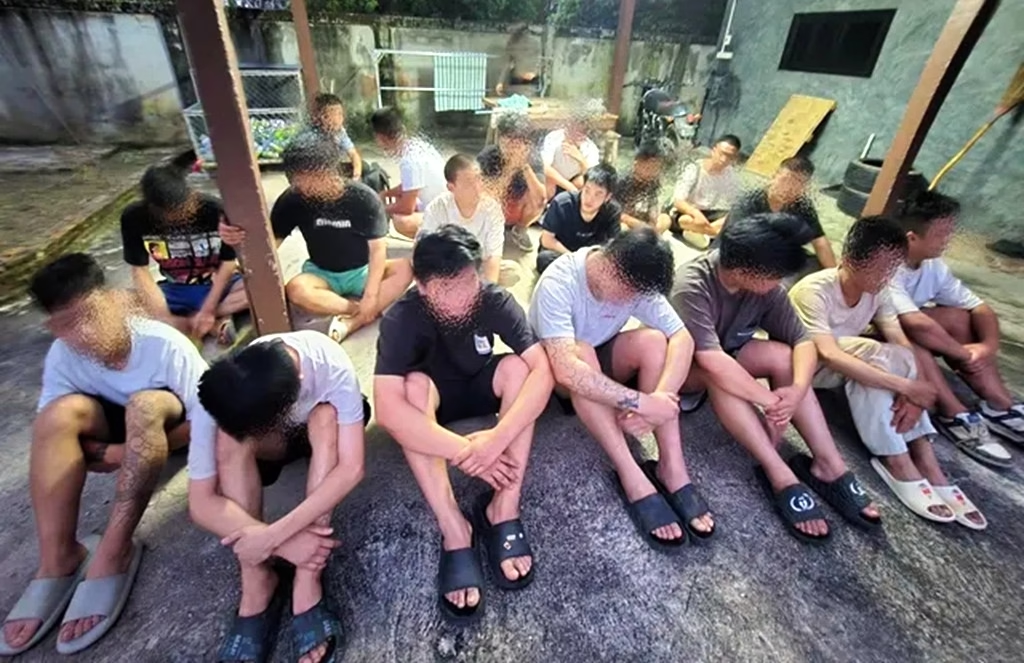
Main Categories of Criminal Activity
Chinese-linked groups have expanded their operations by using Thailand’s tourism systems and weak border areas. Here is a summary of the main categories:
| Category | What it involves | Examples and scale |
|---|---|---|
| Online scams and cyber fraud | Call centres and “pig butchering” schemes using fake investments or romance fraud to target victims worldwide. | Groups in Pattaya run by Chinese, Korean, and Taiwanese suspects stole billions. U.S. victims alone lost an estimated $3.5 billion in 2023 to networks based in Southeast Asia. Compounds near the Thai-Myanmar border, such as around Myawaddy, hold thousands in forced labour. |
| Human trafficking | Victims are lured with fake jobs in Thailand, then trafficked to camps in Myanmar or Laos to work in scams. | More than 160 victims were rescued in joint operations in late 2024. Cases include abducting tourists in Bangkok for ransom or forced work. Thailand identified 644 potential trafficking victims in 2024, many linked to Chinese syndicates. |
| Drug trafficking and smuggling | Heroin, meth, and synthetic drugs move through the Golden Triangle, with Thailand used to launder proceeds and as a transit hub. | Rosewood smuggling to China via eastern borders overlaps with drug routes. Cocaine networks include African groups, with Chinese operators handling money flows. Drug offences were a major share of Thailand’s 500,000-plus reported cases in 2024. |
| Money laundering and gambling | Dirty money is pushed through property, casinos, and online betting. Some suspects use sham marriages and real estate to stay long-term. | About $1.6 million in assets were seized in trafficking cases in 2024. Scam earnings are estimated in the tens of billions each year, with grey capital reaching Thai elites. |
| Violent and opportunistic crimes | Robberies, assaults, and contract hits against tourists or rivals, often by those overstaying visas. | A series of cases against Chinese visitors in Bangkok led to tighter visa checks. A high-profile arrest in May 2025 involved gang leader “Ah Ma,” tied to sheltering migrants linked to a Cambodian MP’s killing. |
These activities feed each other. Scam profits fund drugs and trafficking networks. Thailand’s overall crime rate rose modestly, with homicides increasing from 1.9 per 100,000 in 2022 to 2.6 in 2024. Cases involving foreign suspects grew faster, with property crimes up 10.5 percent and violent crimes up 8.6 percent in fiscal 2024 to 2025.
What Is Driving the Increase
- Tourism and visa rules: A 60-day visa exemption for Chinese visitors in 2024 boosted arrivals, but it also made it easier for offenders to blend in. Thailand tightened screening in early 2025 after a wave of tourist kidnappings. Proximity to scam hubs in Myanmar’s Kayin State, including Shwe Kokko, allows quick movement across borders.
- Geopolitics and economics: China’s large role in Thailand’s economy, including “zero-dollar” tour operations, has made firm action harder. Joint efforts with Beijing have grown, but critics say this increases Chinese sway over Thai security choices.
- Corruption and weak enforcement: Bribes within police and immigration help criminal groups operate. In 2023, 107 officials were charged with issuing visas to scam suspects, yet there were no convictions in 2024. Armed groups in Myanmar protect compounds, making arrests and extraditions difficult.
- Relocation from other crackdowns: After raids in the Philippines, Cambodia, and Laos from 2023 to 2024, syndicates shifted closer to Thailand. Evictions at Shwe Kokko from May to October 2024 pushed groups to Payathonzu, near the Thai border.
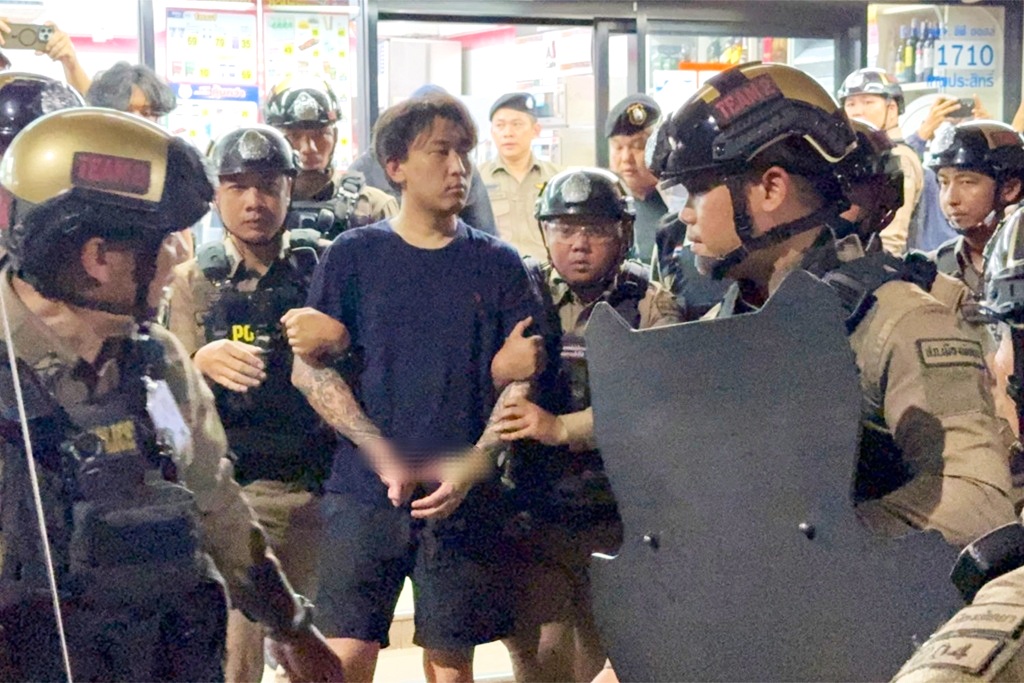
Government and Cross-Border Responses
The Royal Thai Police reported solving 93 percent of more than 500,000 cases in 2024, including focused raids on call centres. In August, officers arrested 15 Chinese suspects. Prime Minister Paetongtarn Shinawatra ordered tighter immigration checks in January 2025, with more screening at land borders and airports.
Regional and international actions include:
- Operation Seagull (August to December 2024): China, Thailand, Cambodia, Laos, Myanmar, and Vietnam arrested more than 70,000 suspects and rescued over 160 victims.
- China-Thailand Joint Centre (since 2023): Targets scam networks. Talks in February 2025 focused on Myanmar’s Border Guard Force leaders.
- U.S. and UN action: The 2025 U.S. Trafficking in Persons Report praised progress but flagged a lack of prosecutions against officials. UNODC estimates scam revenues in the tens of billions.
Critics say these actions remain surface-level while some Thai officials still profit from border casinos and grey markets. Asset seizures reached 56 million baht (about $1.6 million) in 2024, but victim compensation is limited.
Impacts and Outlook
The crisis has cut Chinese bookings for 2025 events, with cancellations from major performers such as Eason Chan. It threatens Thailand’s tourism earnings, worth about $40 billion, and weakens public trust in policing. The problem also fuels instability across the region, with scam networks spreading into Mexico and the United States.
Looking ahead, tougher visas, anti-corruption drives, and sanctions led by the U.S. could slow these networks. China’s growing role in joint security operations may complicate Thailand’s ability to act on its own. As of November 2025, arrests continue, but weak border control and protection for compounds suggest the problem is far from over.




